Entrepreneurship and Small Business Management: An In-depth Analysis
VerifiedAdded on 2020/06/06
|13
|3773
|78
Report
AI Summary
This report provides a comprehensive analysis of entrepreneurship and small business management, examining different types of entrepreneurial ventures, the skills and qualities of successful entrepreneurs like Bill Gates and Mark Zuckerberg, and the impact of micro and small businesses on the local, regional, national, and international economy. It delves into the similarities and dissimilarities between entrepreneurial ventures such as survival, lifestyle, managed growth, and aggressive growth, while also highlighting the importance of small businesses in fostering social economy growth. The report further discusses the role of private, public, and social enterprises, and explores how factors like local, regional, and national economic changes can affect these businesses. It concludes by emphasizing the significance of adaptability, creativity, and customer-centric approaches in ensuring the success of small businesses.

ENTREPRENEURSHIP
AND SMALL BUSINESS
MANAGEMENT
AND SMALL BUSINESS
MANAGEMENT
Paraphrase This Document
Need a fresh take? Get an instant paraphrase of this document with our AI Paraphraser
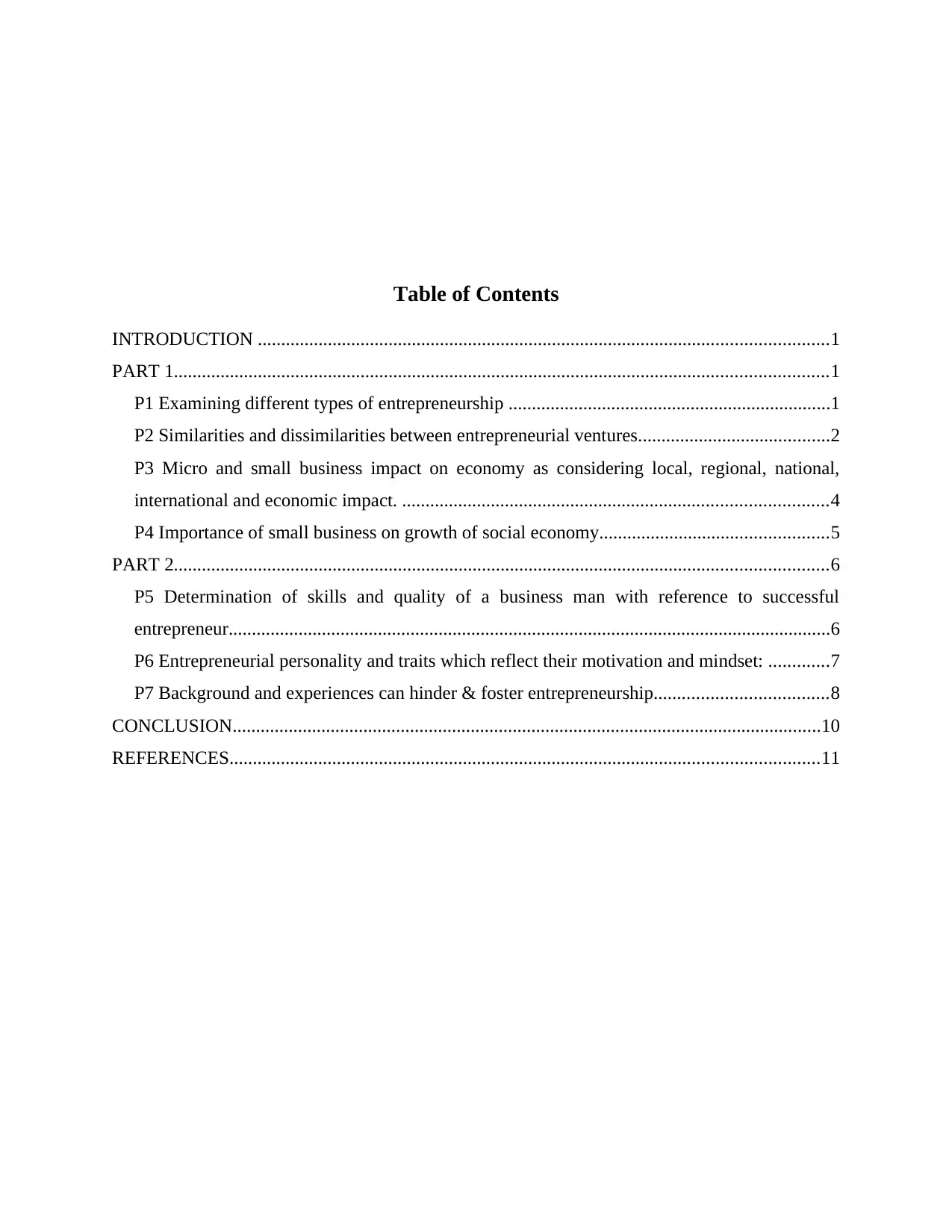
Table of Contents
INTRODUCTION ..........................................................................................................................1
PART 1............................................................................................................................................1
P1 Examining different types of entrepreneurship .....................................................................1
P2 Similarities and dissimilarities between entrepreneurial ventures.........................................2
P3 Micro and small business impact on economy as considering local, regional, national,
international and economic impact. ...........................................................................................4
P4 Importance of small business on growth of social economy.................................................5
PART 2............................................................................................................................................6
P5 Determination of skills and quality of a business man with reference to successful
entrepreneur.................................................................................................................................6
P6 Entrepreneurial personality and traits which reflect their motivation and mindset: .............7
P7 Background and experiences can hinder & foster entrepreneurship.....................................8
CONCLUSION..............................................................................................................................10
REFERENCES..............................................................................................................................11
INTRODUCTION ..........................................................................................................................1
PART 1............................................................................................................................................1
P1 Examining different types of entrepreneurship .....................................................................1
P2 Similarities and dissimilarities between entrepreneurial ventures.........................................2
P3 Micro and small business impact on economy as considering local, regional, national,
international and economic impact. ...........................................................................................4
P4 Importance of small business on growth of social economy.................................................5
PART 2............................................................................................................................................6
P5 Determination of skills and quality of a business man with reference to successful
entrepreneur.................................................................................................................................6
P6 Entrepreneurial personality and traits which reflect their motivation and mindset: .............7
P7 Background and experiences can hinder & foster entrepreneurship.....................................8
CONCLUSION..............................................................................................................................10
REFERENCES..............................................................................................................................11
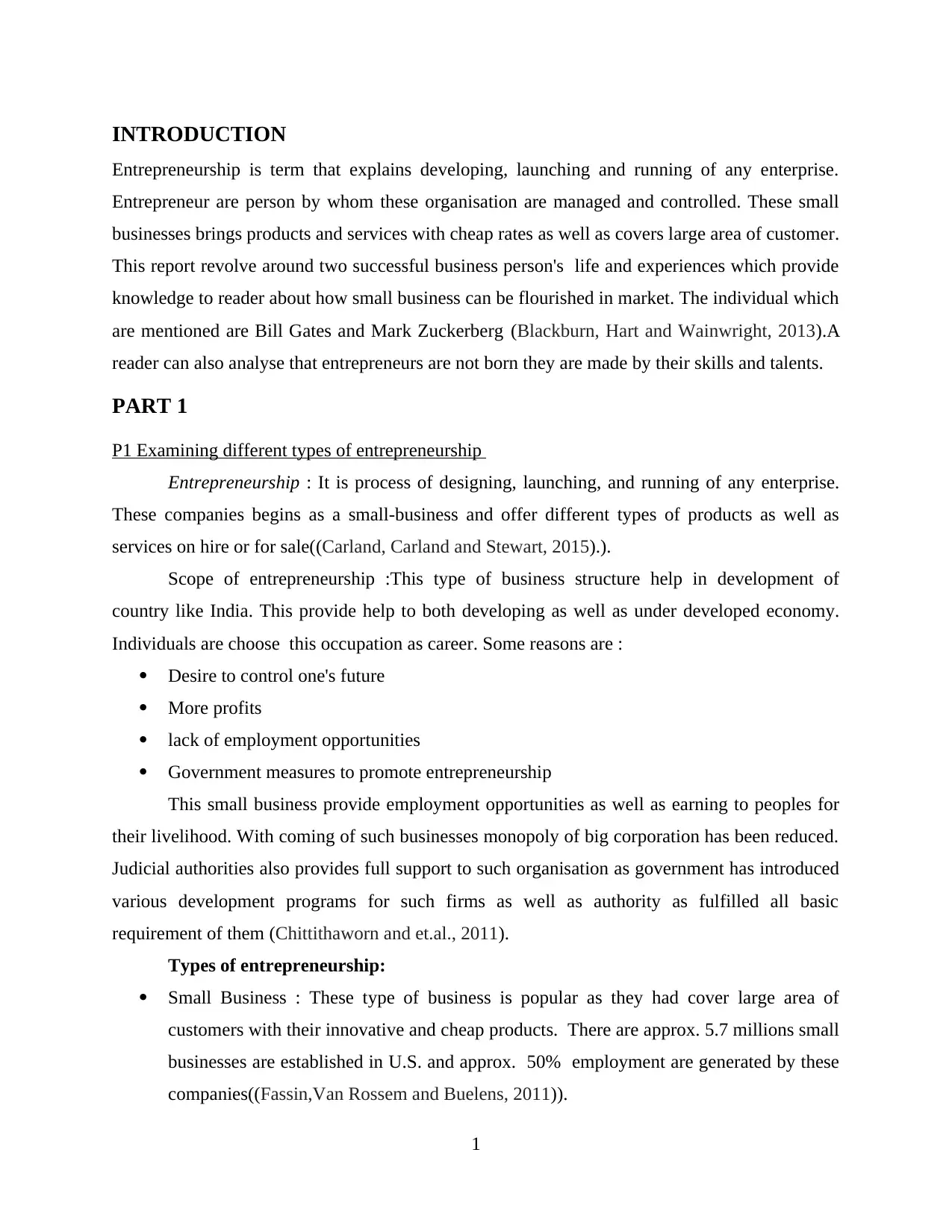
INTRODUCTION
Entrepreneurship is term that explains developing, launching and running of any enterprise.
Entrepreneur are person by whom these organisation are managed and controlled. These small
businesses brings products and services with cheap rates as well as covers large area of customer.
This report revolve around two successful business person's life and experiences which provide
knowledge to reader about how small business can be flourished in market. The individual which
are mentioned are Bill Gates and Mark Zuckerberg (Blackburn, Hart and Wainwright, 2013).A
reader can also analyse that entrepreneurs are not born they are made by their skills and talents.
PART 1
P1 Examining different types of entrepreneurship
Entrepreneurship : It is process of designing, launching, and running of any enterprise.
These companies begins as a small-business and offer different types of products as well as
services on hire or for sale((Carland, Carland and Stewart, 2015).).
Scope of entrepreneurship :This type of business structure help in development of
country like India. This provide help to both developing as well as under developed economy.
Individuals are choose this occupation as career. Some reasons are :
Desire to control one's future
More profits
lack of employment opportunities
Government measures to promote entrepreneurship
This small business provide employment opportunities as well as earning to peoples for
their livelihood. With coming of such businesses monopoly of big corporation has been reduced.
Judicial authorities also provides full support to such organisation as government has introduced
various development programs for such firms as well as authority as fulfilled all basic
requirement of them (Chittithaworn and et.al., 2011).
Types of entrepreneurship:
Small Business : These type of business is popular as they had cover large area of
customers with their innovative and cheap products. There are approx. 5.7 millions small
businesses are established in U.S. and approx. 50% employment are generated by these
companies((Fassin,Van Rossem and Buelens, 2011)).
1
Entrepreneurship is term that explains developing, launching and running of any enterprise.
Entrepreneur are person by whom these organisation are managed and controlled. These small
businesses brings products and services with cheap rates as well as covers large area of customer.
This report revolve around two successful business person's life and experiences which provide
knowledge to reader about how small business can be flourished in market. The individual which
are mentioned are Bill Gates and Mark Zuckerberg (Blackburn, Hart and Wainwright, 2013).A
reader can also analyse that entrepreneurs are not born they are made by their skills and talents.
PART 1
P1 Examining different types of entrepreneurship
Entrepreneurship : It is process of designing, launching, and running of any enterprise.
These companies begins as a small-business and offer different types of products as well as
services on hire or for sale((Carland, Carland and Stewart, 2015).).
Scope of entrepreneurship :This type of business structure help in development of
country like India. This provide help to both developing as well as under developed economy.
Individuals are choose this occupation as career. Some reasons are :
Desire to control one's future
More profits
lack of employment opportunities
Government measures to promote entrepreneurship
This small business provide employment opportunities as well as earning to peoples for
their livelihood. With coming of such businesses monopoly of big corporation has been reduced.
Judicial authorities also provides full support to such organisation as government has introduced
various development programs for such firms as well as authority as fulfilled all basic
requirement of them (Chittithaworn and et.al., 2011).
Types of entrepreneurship:
Small Business : These type of business is popular as they had cover large area of
customers with their innovative and cheap products. There are approx. 5.7 millions small
businesses are established in U.S. and approx. 50% employment are generated by these
companies((Fassin,Van Rossem and Buelens, 2011)).
1
⊘ This is a preview!⊘
Do you want full access?
Subscribe today to unlock all pages.

Trusted by 1+ million students worldwide
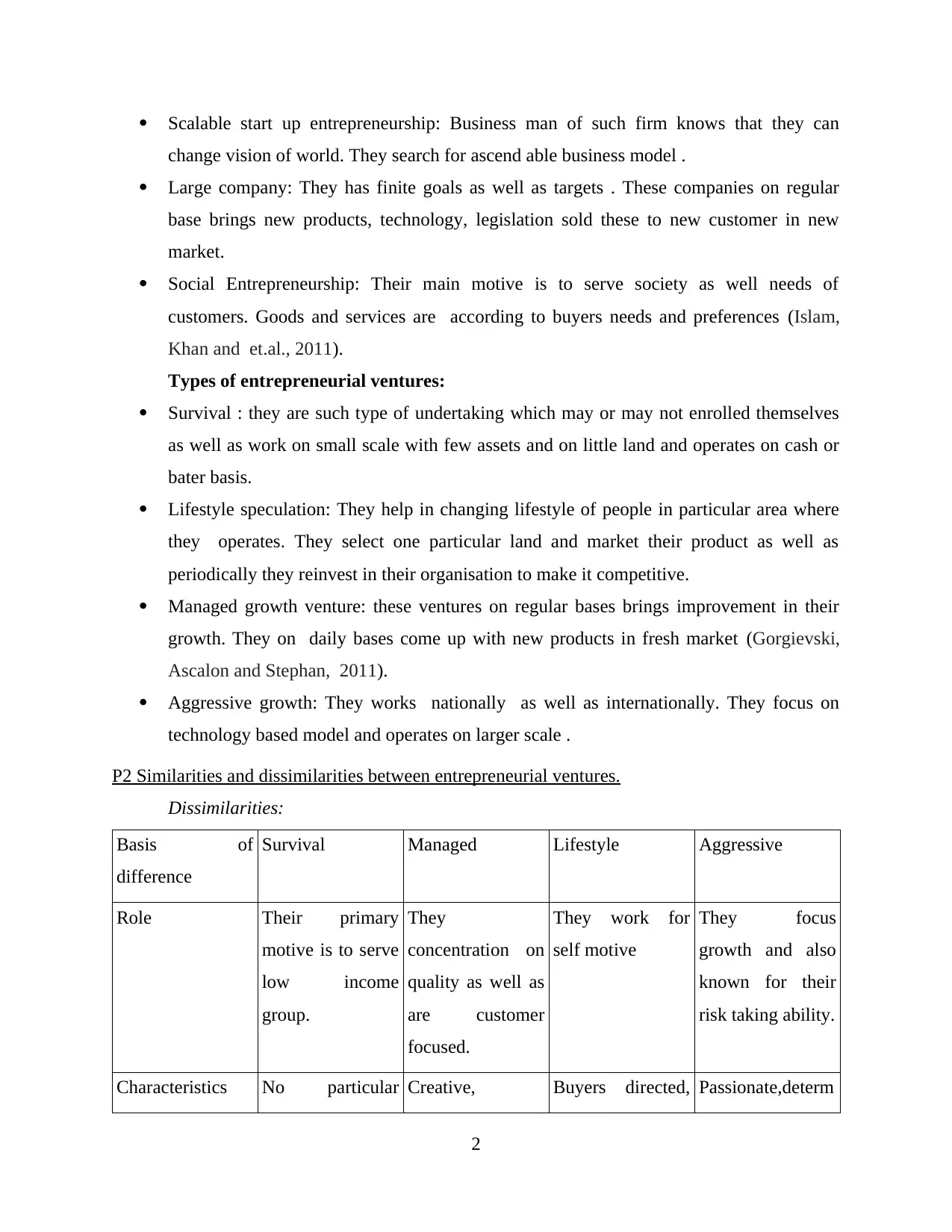
Scalable start up entrepreneurship: Business man of such firm knows that they can
change vision of world. They search for ascend able business model .
Large company: They has finite goals as well as targets . These companies on regular
base brings new products, technology, legislation sold these to new customer in new
market.
Social Entrepreneurship: Their main motive is to serve society as well needs of
customers. Goods and services are according to buyers needs and preferences (Islam,
Khan and et.al., 2011).
Types of entrepreneurial ventures:
Survival : they are such type of undertaking which may or may not enrolled themselves
as well as work on small scale with few assets and on little land and operates on cash or
bater basis.
Lifestyle speculation: They help in changing lifestyle of people in particular area where
they operates. They select one particular land and market their product as well as
periodically they reinvest in their organisation to make it competitive.
Managed growth venture: these ventures on regular bases brings improvement in their
growth. They on daily bases come up with new products in fresh market (Gorgievski,
Ascalon and Stephan, 2011).
Aggressive growth: They works nationally as well as internationally. They focus on
technology based model and operates on larger scale .
P2 Similarities and dissimilarities between entrepreneurial ventures.
Dissimilarities:
Basis of
difference
Survival Managed Lifestyle Aggressive
Role Their primary
motive is to serve
low income
group.
They
concentration on
quality as well as
are customer
focused.
They work for
self motive
They focus
growth and also
known for their
risk taking ability.
Characteristics No particular Creative, Buyers directed, Passionate,determ
2
change vision of world. They search for ascend able business model .
Large company: They has finite goals as well as targets . These companies on regular
base brings new products, technology, legislation sold these to new customer in new
market.
Social Entrepreneurship: Their main motive is to serve society as well needs of
customers. Goods and services are according to buyers needs and preferences (Islam,
Khan and et.al., 2011).
Types of entrepreneurial ventures:
Survival : they are such type of undertaking which may or may not enrolled themselves
as well as work on small scale with few assets and on little land and operates on cash or
bater basis.
Lifestyle speculation: They help in changing lifestyle of people in particular area where
they operates. They select one particular land and market their product as well as
periodically they reinvest in their organisation to make it competitive.
Managed growth venture: these ventures on regular bases brings improvement in their
growth. They on daily bases come up with new products in fresh market (Gorgievski,
Ascalon and Stephan, 2011).
Aggressive growth: They works nationally as well as internationally. They focus on
technology based model and operates on larger scale .
P2 Similarities and dissimilarities between entrepreneurial ventures.
Dissimilarities:
Basis of
difference
Survival Managed Lifestyle Aggressive
Role Their primary
motive is to serve
low income
group.
They
concentration on
quality as well as
are customer
focused.
They work for
self motive
They focus
growth and also
known for their
risk taking ability.
Characteristics No particular Creative, Buyers directed, Passionate,determ
2
Paraphrase This Document
Need a fresh take? Get an instant paraphrase of this document with our AI Paraphraser
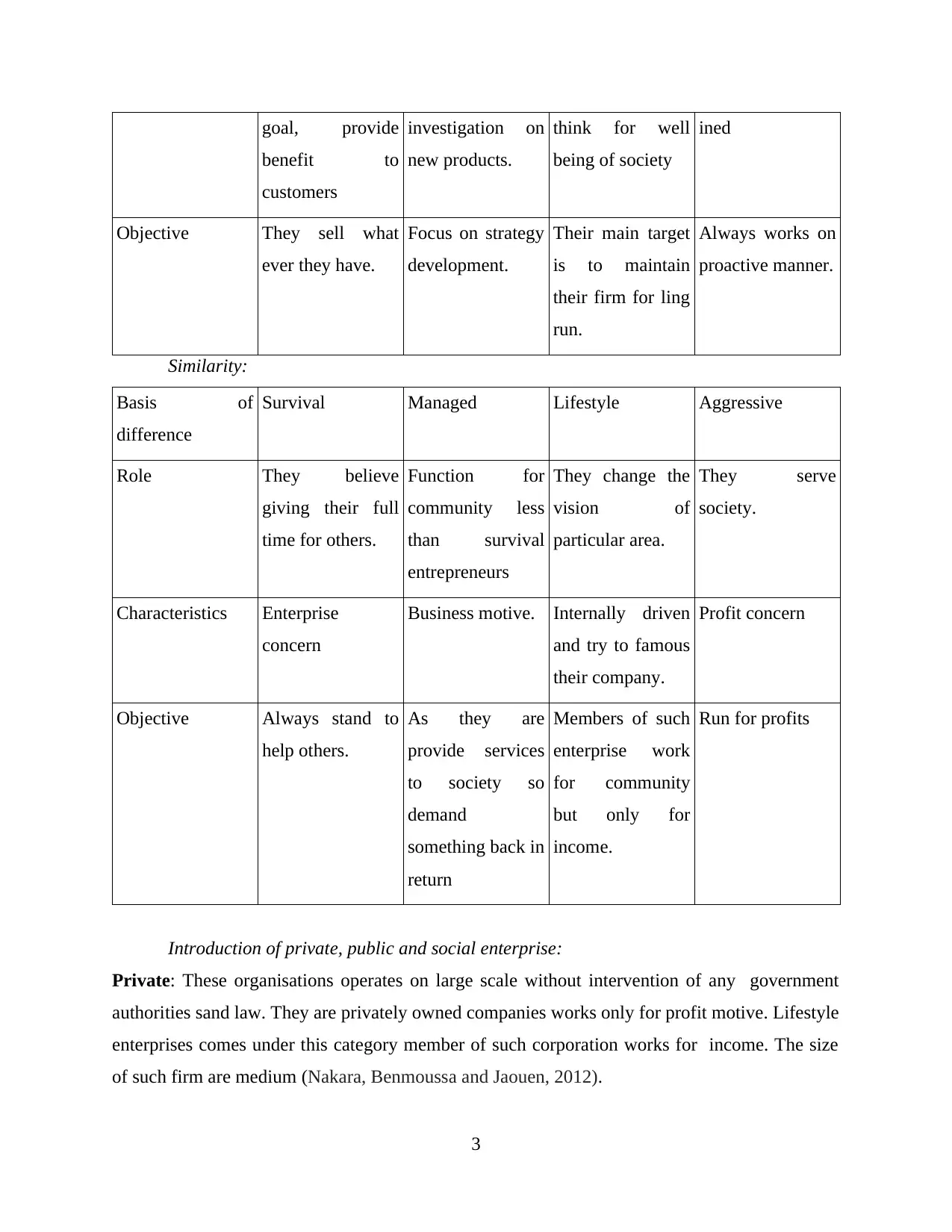
goal, provide
benefit to
customers
investigation on
new products.
think for well
being of society
ined
Objective They sell what
ever they have.
Focus on strategy
development.
Their main target
is to maintain
their firm for ling
run.
Always works on
proactive manner.
Similarity:
Basis of
difference
Survival Managed Lifestyle Aggressive
Role They believe
giving their full
time for others.
Function for
community less
than survival
entrepreneurs
They change the
vision of
particular area.
They serve
society.
Characteristics Enterprise
concern
Business motive. Internally driven
and try to famous
their company.
Profit concern
Objective Always stand to
help others.
As they are
provide services
to society so
demand
something back in
return
Members of such
enterprise work
for community
but only for
income.
Run for profits
Introduction of private, public and social enterprise:
Private: These organisations operates on large scale without intervention of any government
authorities sand law. They are privately owned companies works only for profit motive. Lifestyle
enterprises comes under this category member of such corporation works for income. The size
of such firm are medium (Nakara, Benmoussa and Jaouen, 2012).
3
benefit to
customers
investigation on
new products.
think for well
being of society
ined
Objective They sell what
ever they have.
Focus on strategy
development.
Their main target
is to maintain
their firm for ling
run.
Always works on
proactive manner.
Similarity:
Basis of
difference
Survival Managed Lifestyle Aggressive
Role They believe
giving their full
time for others.
Function for
community less
than survival
entrepreneurs
They change the
vision of
particular area.
They serve
society.
Characteristics Enterprise
concern
Business motive. Internally driven
and try to famous
their company.
Profit concern
Objective Always stand to
help others.
As they are
provide services
to society so
demand
something back in
return
Members of such
enterprise work
for community
but only for
income.
Run for profits
Introduction of private, public and social enterprise:
Private: These organisations operates on large scale without intervention of any government
authorities sand law. They are privately owned companies works only for profit motive. Lifestyle
enterprises comes under this category member of such corporation works for income. The size
of such firm are medium (Nakara, Benmoussa and Jaouen, 2012).
3
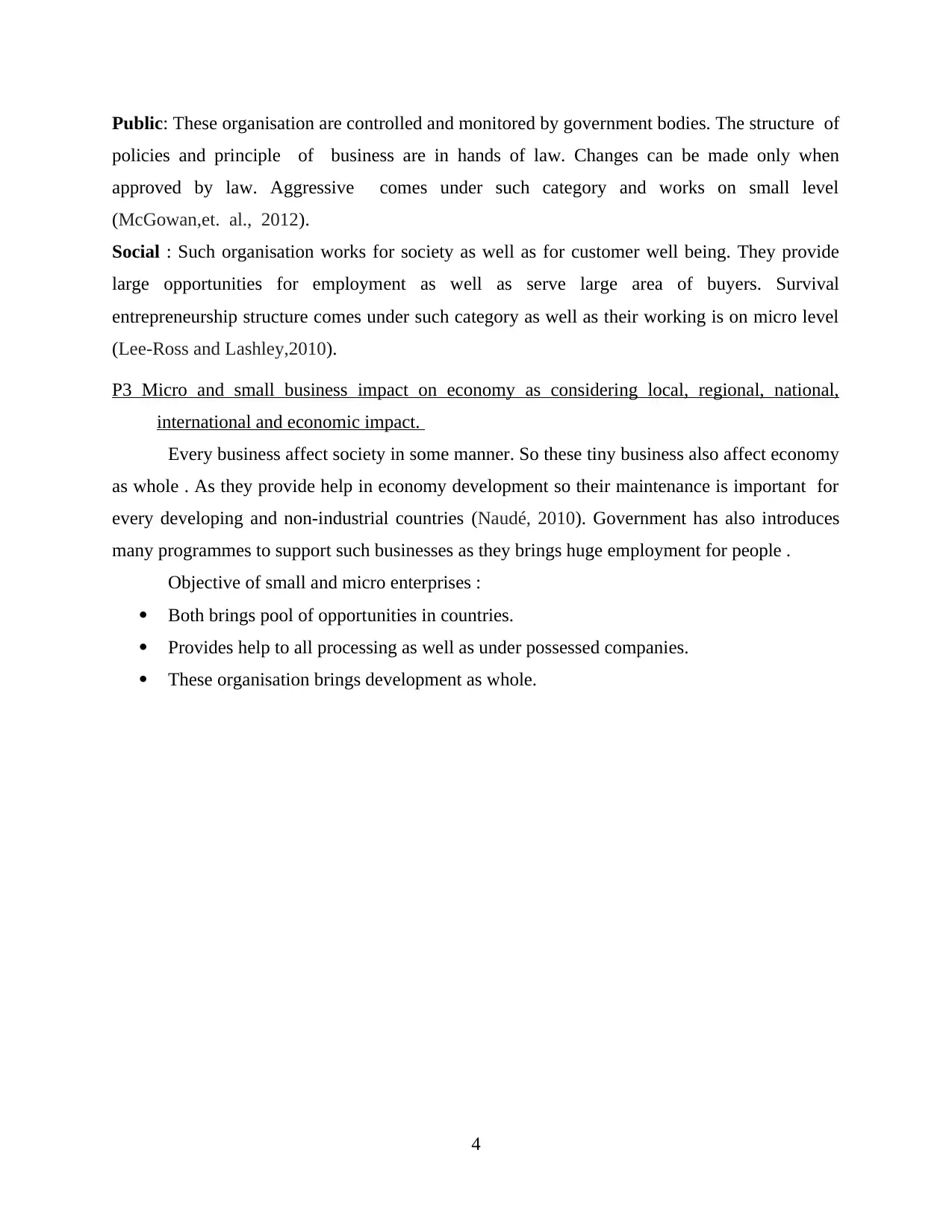
Public: These organisation are controlled and monitored by government bodies. The structure of
policies and principle of business are in hands of law. Changes can be made only when
approved by law. Aggressive comes under such category and works on small level
(McGowan,et. al., 2012).
Social : Such organisation works for society as well as for customer well being. They provide
large opportunities for employment as well as serve large area of buyers. Survival
entrepreneurship structure comes under such category as well as their working is on micro level
(Lee-Ross and Lashley,2010).
P3 Micro and small business impact on economy as considering local, regional, national,
international and economic impact.
Every business affect society in some manner. So these tiny business also affect economy
as whole . As they provide help in economy development so their maintenance is important for
every developing and non-industrial countries (Naudé, 2010). Government has also introduces
many programmes to support such businesses as they brings huge employment for people .
Objective of small and micro enterprises :
Both brings pool of opportunities in countries.
Provides help to all processing as well as under possessed companies.
These organisation brings development as whole.
4
policies and principle of business are in hands of law. Changes can be made only when
approved by law. Aggressive comes under such category and works on small level
(McGowan,et. al., 2012).
Social : Such organisation works for society as well as for customer well being. They provide
large opportunities for employment as well as serve large area of buyers. Survival
entrepreneurship structure comes under such category as well as their working is on micro level
(Lee-Ross and Lashley,2010).
P3 Micro and small business impact on economy as considering local, regional, national,
international and economic impact.
Every business affect society in some manner. So these tiny business also affect economy
as whole . As they provide help in economy development so their maintenance is important for
every developing and non-industrial countries (Naudé, 2010). Government has also introduces
many programmes to support such businesses as they brings huge employment for people .
Objective of small and micro enterprises :
Both brings pool of opportunities in countries.
Provides help to all processing as well as under possessed companies.
These organisation brings development as whole.
4
⊘ This is a preview!⊘
Do you want full access?
Subscribe today to unlock all pages.

Trusted by 1+ million students worldwide
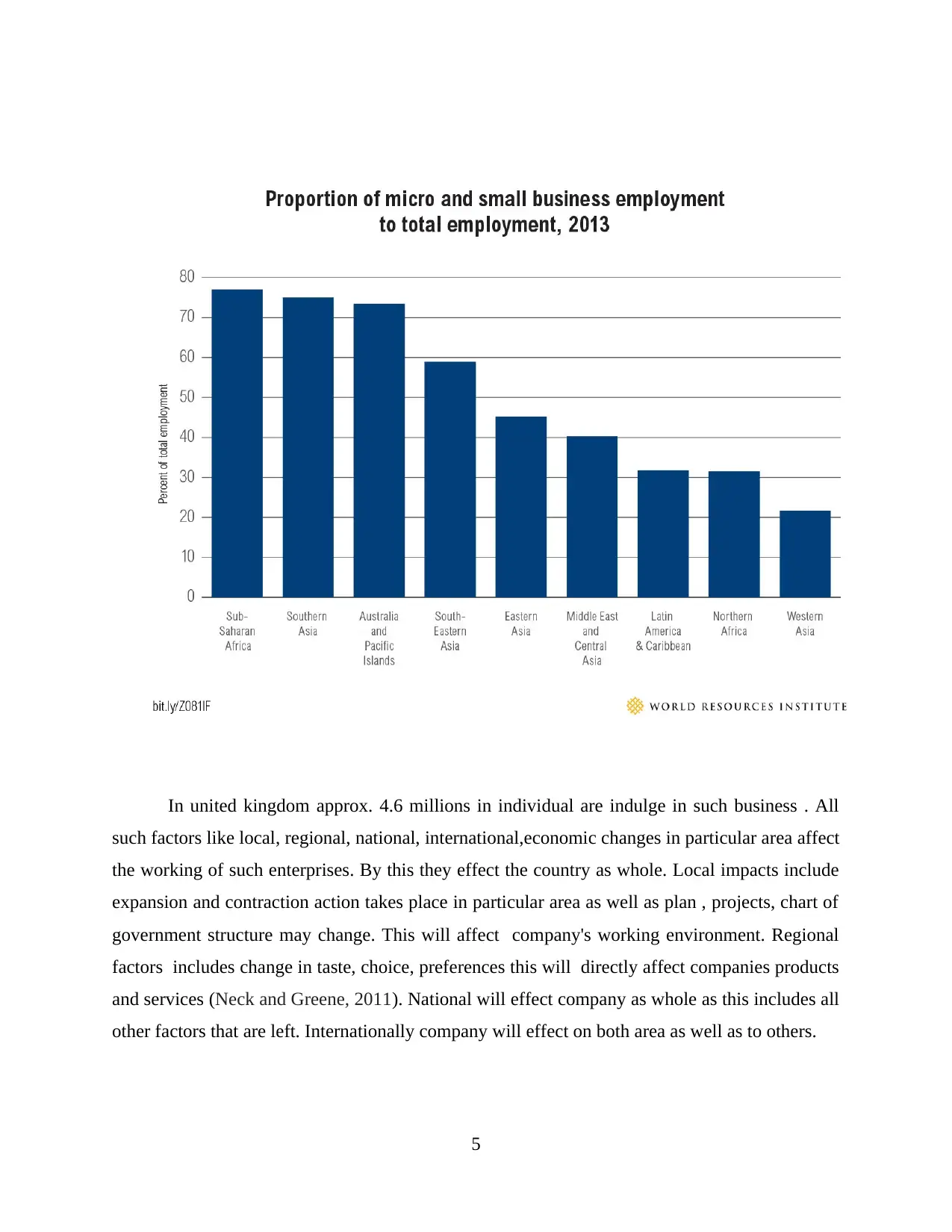
In united kingdom approx. 4.6 millions in individual are indulge in such business . All
such factors like local, regional, national, international,economic changes in particular area affect
the working of such enterprises. By this they effect the country as whole. Local impacts include
expansion and contraction action takes place in particular area as well as plan , projects, chart of
government structure may change. This will affect company's working environment. Regional
factors includes change in taste, choice, preferences this will directly affect companies products
and services (Neck and Greene, 2011). National will effect company as whole as this includes all
other factors that are left. Internationally company will effect on both area as well as to others.
5
such factors like local, regional, national, international,economic changes in particular area affect
the working of such enterprises. By this they effect the country as whole. Local impacts include
expansion and contraction action takes place in particular area as well as plan , projects, chart of
government structure may change. This will affect company's working environment. Regional
factors includes change in taste, choice, preferences this will directly affect companies products
and services (Neck and Greene, 2011). National will effect company as whole as this includes all
other factors that are left. Internationally company will effect on both area as well as to others.
5
Paraphrase This Document
Need a fresh take? Get an instant paraphrase of this document with our AI Paraphraser
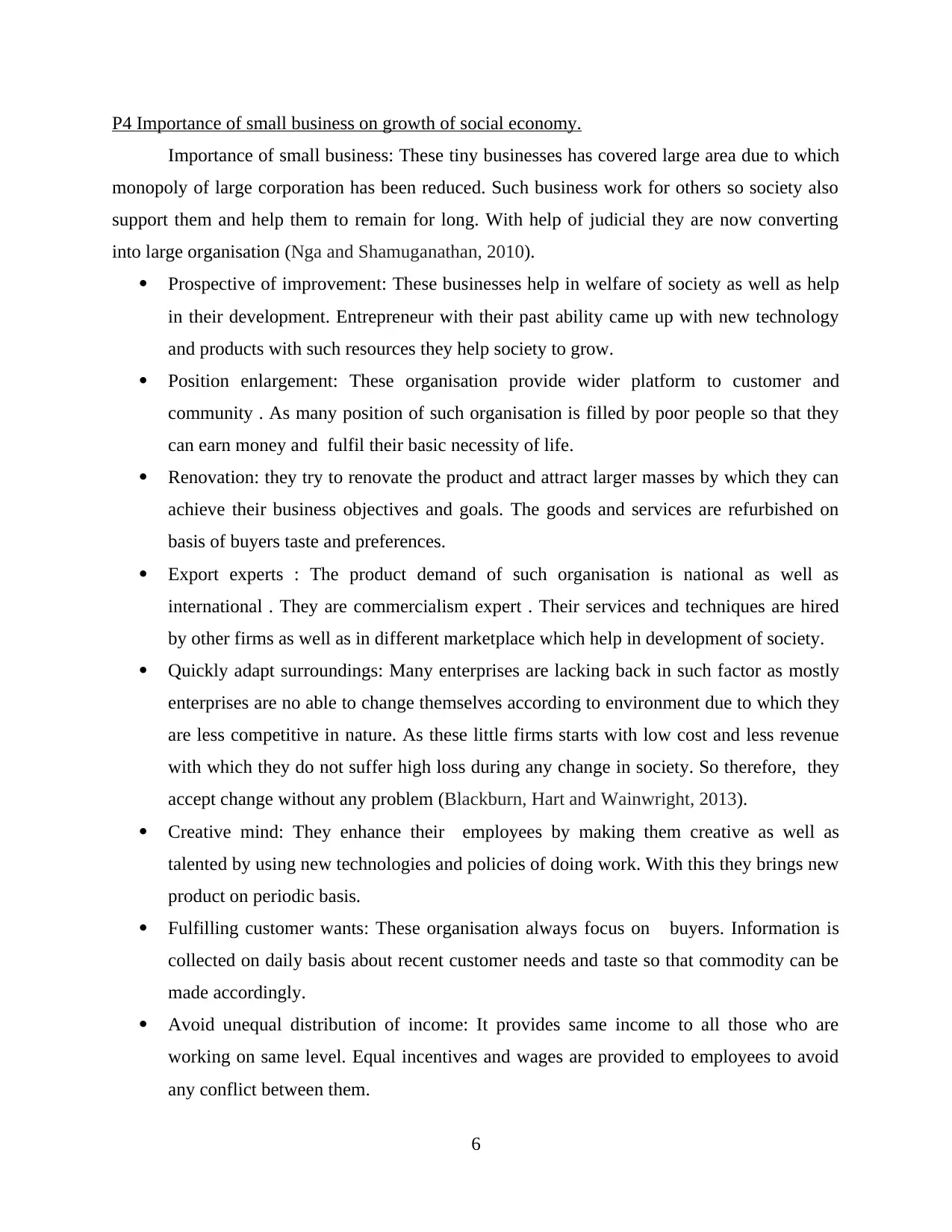
P4 Importance of small business on growth of social economy.
Importance of small business: These tiny businesses has covered large area due to which
monopoly of large corporation has been reduced. Such business work for others so society also
support them and help them to remain for long. With help of judicial they are now converting
into large organisation (Nga and Shamuganathan, 2010).
Prospective of improvement: These businesses help in welfare of society as well as help
in their development. Entrepreneur with their past ability came up with new technology
and products with such resources they help society to grow.
Position enlargement: These organisation provide wider platform to customer and
community . As many position of such organisation is filled by poor people so that they
can earn money and fulfil their basic necessity of life.
Renovation: they try to renovate the product and attract larger masses by which they can
achieve their business objectives and goals. The goods and services are refurbished on
basis of buyers taste and preferences.
Export experts : The product demand of such organisation is national as well as
international . They are commercialism expert . Their services and techniques are hired
by other firms as well as in different marketplace which help in development of society.
Quickly adapt surroundings: Many enterprises are lacking back in such factor as mostly
enterprises are no able to change themselves according to environment due to which they
are less competitive in nature. As these little firms starts with low cost and less revenue
with which they do not suffer high loss during any change in society. So therefore, they
accept change without any problem (Blackburn, Hart and Wainwright, 2013).
Creative mind: They enhance their employees by making them creative as well as
talented by using new technologies and policies of doing work. With this they brings new
product on periodic basis.
Fulfilling customer wants: These organisation always focus on buyers. Information is
collected on daily basis about recent customer needs and taste so that commodity can be
made accordingly.
Avoid unequal distribution of income: It provides same income to all those who are
working on same level. Equal incentives and wages are provided to employees to avoid
any conflict between them.
6
Importance of small business: These tiny businesses has covered large area due to which
monopoly of large corporation has been reduced. Such business work for others so society also
support them and help them to remain for long. With help of judicial they are now converting
into large organisation (Nga and Shamuganathan, 2010).
Prospective of improvement: These businesses help in welfare of society as well as help
in their development. Entrepreneur with their past ability came up with new technology
and products with such resources they help society to grow.
Position enlargement: These organisation provide wider platform to customer and
community . As many position of such organisation is filled by poor people so that they
can earn money and fulfil their basic necessity of life.
Renovation: they try to renovate the product and attract larger masses by which they can
achieve their business objectives and goals. The goods and services are refurbished on
basis of buyers taste and preferences.
Export experts : The product demand of such organisation is national as well as
international . They are commercialism expert . Their services and techniques are hired
by other firms as well as in different marketplace which help in development of society.
Quickly adapt surroundings: Many enterprises are lacking back in such factor as mostly
enterprises are no able to change themselves according to environment due to which they
are less competitive in nature. As these little firms starts with low cost and less revenue
with which they do not suffer high loss during any change in society. So therefore, they
accept change without any problem (Blackburn, Hart and Wainwright, 2013).
Creative mind: They enhance their employees by making them creative as well as
talented by using new technologies and policies of doing work. With this they brings new
product on periodic basis.
Fulfilling customer wants: These organisation always focus on buyers. Information is
collected on daily basis about recent customer needs and taste so that commodity can be
made accordingly.
Avoid unequal distribution of income: It provides same income to all those who are
working on same level. Equal incentives and wages are provided to employees to avoid
any conflict between them.
6
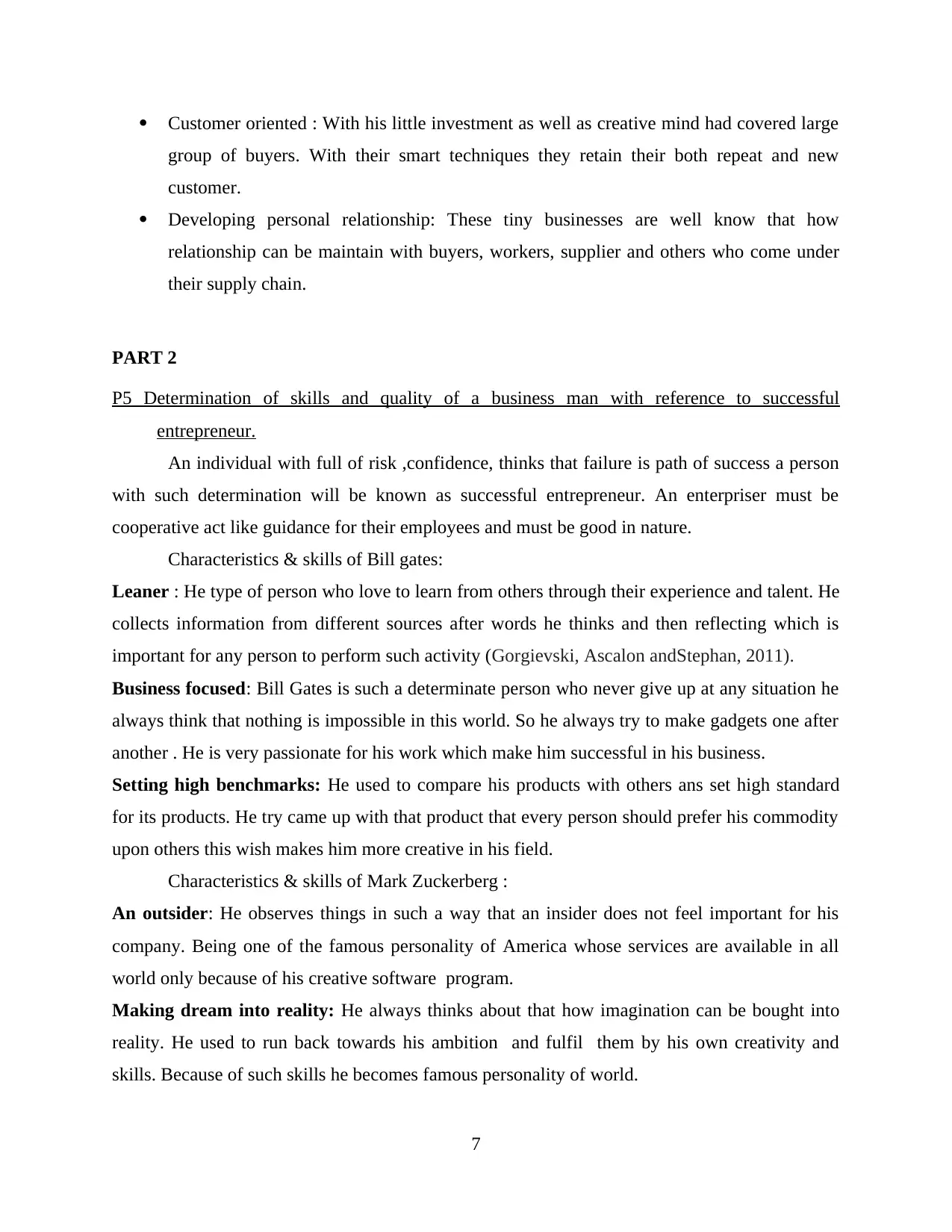
Customer oriented : With his little investment as well as creative mind had covered large
group of buyers. With their smart techniques they retain their both repeat and new
customer.
Developing personal relationship: These tiny businesses are well know that how
relationship can be maintain with buyers, workers, supplier and others who come under
their supply chain.
PART 2
P5 Determination of skills and quality of a business man with reference to successful
entrepreneur.
An individual with full of risk ,confidence, thinks that failure is path of success a person
with such determination will be known as successful entrepreneur. An enterpriser must be
cooperative act like guidance for their employees and must be good in nature.
Characteristics & skills of Bill gates:
Leaner : He type of person who love to learn from others through their experience and talent. He
collects information from different sources after words he thinks and then reflecting which is
important for any person to perform such activity (Gorgievski, Ascalon andStephan, 2011).
Business focused: Bill Gates is such a determinate person who never give up at any situation he
always think that nothing is impossible in this world. So he always try to make gadgets one after
another . He is very passionate for his work which make him successful in his business.
Setting high benchmarks: He used to compare his products with others ans set high standard
for its products. He try came up with that product that every person should prefer his commodity
upon others this wish makes him more creative in his field.
Characteristics & skills of Mark Zuckerberg :
An outsider: He observes things in such a way that an insider does not feel important for his
company. Being one of the famous personality of America whose services are available in all
world only because of his creative software program.
Making dream into reality: He always thinks about that how imagination can be bought into
reality. He used to run back towards his ambition and fulfil them by his own creativity and
skills. Because of such skills he becomes famous personality of world.
7
group of buyers. With their smart techniques they retain their both repeat and new
customer.
Developing personal relationship: These tiny businesses are well know that how
relationship can be maintain with buyers, workers, supplier and others who come under
their supply chain.
PART 2
P5 Determination of skills and quality of a business man with reference to successful
entrepreneur.
An individual with full of risk ,confidence, thinks that failure is path of success a person
with such determination will be known as successful entrepreneur. An enterpriser must be
cooperative act like guidance for their employees and must be good in nature.
Characteristics & skills of Bill gates:
Leaner : He type of person who love to learn from others through their experience and talent. He
collects information from different sources after words he thinks and then reflecting which is
important for any person to perform such activity (Gorgievski, Ascalon andStephan, 2011).
Business focused: Bill Gates is such a determinate person who never give up at any situation he
always think that nothing is impossible in this world. So he always try to make gadgets one after
another . He is very passionate for his work which make him successful in his business.
Setting high benchmarks: He used to compare his products with others ans set high standard
for its products. He try came up with that product that every person should prefer his commodity
upon others this wish makes him more creative in his field.
Characteristics & skills of Mark Zuckerberg :
An outsider: He observes things in such a way that an insider does not feel important for his
company. Being one of the famous personality of America whose services are available in all
world only because of his creative software program.
Making dream into reality: He always thinks about that how imagination can be bought into
reality. He used to run back towards his ambition and fulfil them by his own creativity and
skills. Because of such skills he becomes famous personality of world.
7
⊘ This is a preview!⊘
Do you want full access?
Subscribe today to unlock all pages.

Trusted by 1+ million students worldwide
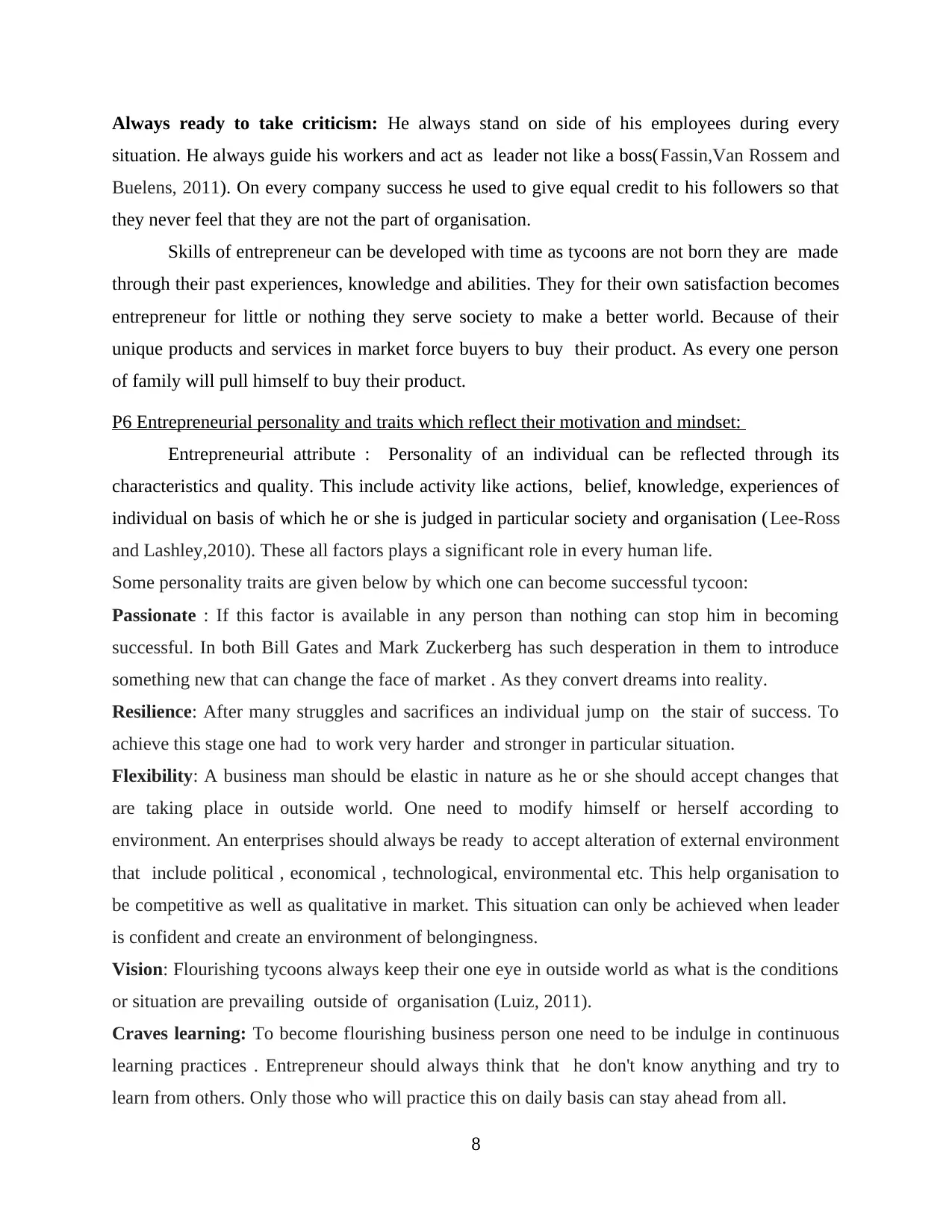
Always ready to take criticism: He always stand on side of his employees during every
situation. He always guide his workers and act as leader not like a boss(Fassin,Van Rossem and
Buelens, 2011). On every company success he used to give equal credit to his followers so that
they never feel that they are not the part of organisation.
Skills of entrepreneur can be developed with time as tycoons are not born they are made
through their past experiences, knowledge and abilities. They for their own satisfaction becomes
entrepreneur for little or nothing they serve society to make a better world. Because of their
unique products and services in market force buyers to buy their product. As every one person
of family will pull himself to buy their product.
P6 Entrepreneurial personality and traits which reflect their motivation and mindset:
Entrepreneurial attribute : Personality of an individual can be reflected through its
characteristics and quality. This include activity like actions, belief, knowledge, experiences of
individual on basis of which he or she is judged in particular society and organisation (Lee-Ross
and Lashley,2010). These all factors plays a significant role in every human life.
Some personality traits are given below by which one can become successful tycoon:
Passionate : If this factor is available in any person than nothing can stop him in becoming
successful. In both Bill Gates and Mark Zuckerberg has such desperation in them to introduce
something new that can change the face of market . As they convert dreams into reality.
Resilience: After many struggles and sacrifices an individual jump on the stair of success. To
achieve this stage one had to work very harder and stronger in particular situation.
Flexibility: A business man should be elastic in nature as he or she should accept changes that
are taking place in outside world. One need to modify himself or herself according to
environment. An enterprises should always be ready to accept alteration of external environment
that include political , economical , technological, environmental etc. This help organisation to
be competitive as well as qualitative in market. This situation can only be achieved when leader
is confident and create an environment of belongingness.
Vision: Flourishing tycoons always keep their one eye in outside world as what is the conditions
or situation are prevailing outside of organisation (Luiz, 2011).
Craves learning: To become flourishing business person one need to be indulge in continuous
learning practices . Entrepreneur should always think that he don't know anything and try to
learn from others. Only those who will practice this on daily basis can stay ahead from all.
8
situation. He always guide his workers and act as leader not like a boss(Fassin,Van Rossem and
Buelens, 2011). On every company success he used to give equal credit to his followers so that
they never feel that they are not the part of organisation.
Skills of entrepreneur can be developed with time as tycoons are not born they are made
through their past experiences, knowledge and abilities. They for their own satisfaction becomes
entrepreneur for little or nothing they serve society to make a better world. Because of their
unique products and services in market force buyers to buy their product. As every one person
of family will pull himself to buy their product.
P6 Entrepreneurial personality and traits which reflect their motivation and mindset:
Entrepreneurial attribute : Personality of an individual can be reflected through its
characteristics and quality. This include activity like actions, belief, knowledge, experiences of
individual on basis of which he or she is judged in particular society and organisation (Lee-Ross
and Lashley,2010). These all factors plays a significant role in every human life.
Some personality traits are given below by which one can become successful tycoon:
Passionate : If this factor is available in any person than nothing can stop him in becoming
successful. In both Bill Gates and Mark Zuckerberg has such desperation in them to introduce
something new that can change the face of market . As they convert dreams into reality.
Resilience: After many struggles and sacrifices an individual jump on the stair of success. To
achieve this stage one had to work very harder and stronger in particular situation.
Flexibility: A business man should be elastic in nature as he or she should accept changes that
are taking place in outside world. One need to modify himself or herself according to
environment. An enterprises should always be ready to accept alteration of external environment
that include political , economical , technological, environmental etc. This help organisation to
be competitive as well as qualitative in market. This situation can only be achieved when leader
is confident and create an environment of belongingness.
Vision: Flourishing tycoons always keep their one eye in outside world as what is the conditions
or situation are prevailing outside of organisation (Luiz, 2011).
Craves learning: To become flourishing business person one need to be indulge in continuous
learning practices . Entrepreneur should always think that he don't know anything and try to
learn from others. Only those who will practice this on daily basis can stay ahead from all.
8
Paraphrase This Document
Need a fresh take? Get an instant paraphrase of this document with our AI Paraphraser
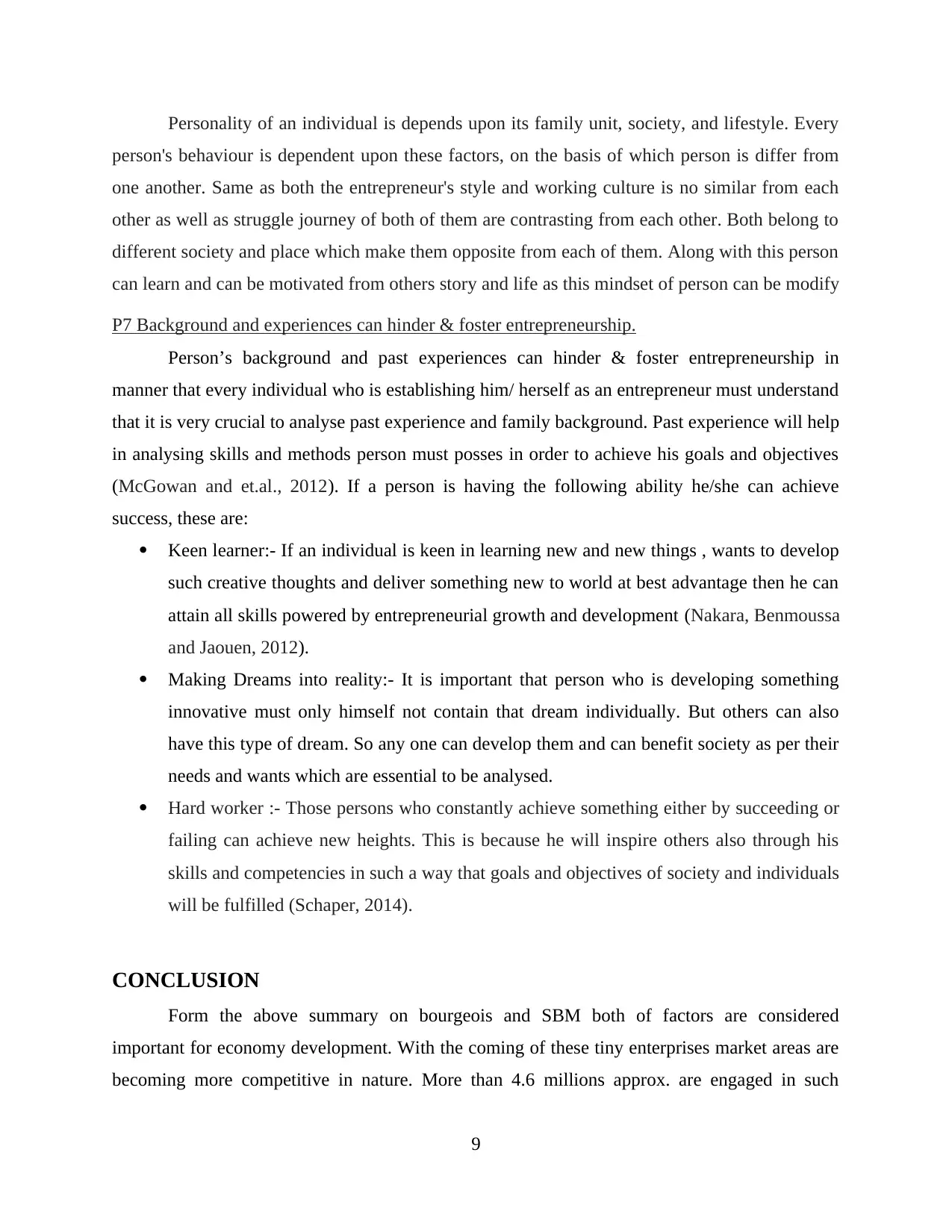
Personality of an individual is depends upon its family unit, society, and lifestyle. Every
person's behaviour is dependent upon these factors, on the basis of which person is differ from
one another. Same as both the entrepreneur's style and working culture is no similar from each
other as well as struggle journey of both of them are contrasting from each other. Both belong to
different society and place which make them opposite from each of them. Along with this person
can learn and can be motivated from others story and life as this mindset of person can be modify
P7 Background and experiences can hinder & foster entrepreneurship.
Person’s background and past experiences can hinder & foster entrepreneurship in
manner that every individual who is establishing him/ herself as an entrepreneur must understand
that it is very crucial to analyse past experience and family background. Past experience will help
in analysing skills and methods person must posses in order to achieve his goals and objectives
(McGowan and et.al., 2012). If a person is having the following ability he/she can achieve
success, these are:
Keen learner:- If an individual is keen in learning new and new things , wants to develop
such creative thoughts and deliver something new to world at best advantage then he can
attain all skills powered by entrepreneurial growth and development (Nakara, Benmoussa
and Jaouen, 2012).
Making Dreams into reality:- It is important that person who is developing something
innovative must only himself not contain that dream individually. But others can also
have this type of dream. So any one can develop them and can benefit society as per their
needs and wants which are essential to be analysed.
Hard worker :- Those persons who constantly achieve something either by succeeding or
failing can achieve new heights. This is because he will inspire others also through his
skills and competencies in such a way that goals and objectives of society and individuals
will be fulfilled (Schaper, 2014).
CONCLUSION
Form the above summary on bourgeois and SBM both of factors are considered
important for economy development. With the coming of these tiny enterprises market areas are
becoming more competitive in nature. More than 4.6 millions approx. are engaged in such
9
person's behaviour is dependent upon these factors, on the basis of which person is differ from
one another. Same as both the entrepreneur's style and working culture is no similar from each
other as well as struggle journey of both of them are contrasting from each other. Both belong to
different society and place which make them opposite from each of them. Along with this person
can learn and can be motivated from others story and life as this mindset of person can be modify
P7 Background and experiences can hinder & foster entrepreneurship.
Person’s background and past experiences can hinder & foster entrepreneurship in
manner that every individual who is establishing him/ herself as an entrepreneur must understand
that it is very crucial to analyse past experience and family background. Past experience will help
in analysing skills and methods person must posses in order to achieve his goals and objectives
(McGowan and et.al., 2012). If a person is having the following ability he/she can achieve
success, these are:
Keen learner:- If an individual is keen in learning new and new things , wants to develop
such creative thoughts and deliver something new to world at best advantage then he can
attain all skills powered by entrepreneurial growth and development (Nakara, Benmoussa
and Jaouen, 2012).
Making Dreams into reality:- It is important that person who is developing something
innovative must only himself not contain that dream individually. But others can also
have this type of dream. So any one can develop them and can benefit society as per their
needs and wants which are essential to be analysed.
Hard worker :- Those persons who constantly achieve something either by succeeding or
failing can achieve new heights. This is because he will inspire others also through his
skills and competencies in such a way that goals and objectives of society and individuals
will be fulfilled (Schaper, 2014).
CONCLUSION
Form the above summary on bourgeois and SBM both of factors are considered
important for economy development. With the coming of these tiny enterprises market areas are
becoming more competitive in nature. More than 4.6 millions approx. are engaged in such
9

activities and are becoming entrepreneurs. Entrepreneurs are not born they are developed by their
skills, determination, vision, passion as well as they are differ due to their beliefs, values,
attribute are not same in particular culture. Steps should be taken to eliminates the competitive
factors. This competencies will help in achieving business objectives and also development of
economy as whole.
10
skills, determination, vision, passion as well as they are differ due to their beliefs, values,
attribute are not same in particular culture. Steps should be taken to eliminates the competitive
factors. This competencies will help in achieving business objectives and also development of
economy as whole.
10
⊘ This is a preview!⊘
Do you want full access?
Subscribe today to unlock all pages.

Trusted by 1+ million students worldwide
1 out of 13
Related Documents
Your All-in-One AI-Powered Toolkit for Academic Success.
+13062052269
info@desklib.com
Available 24*7 on WhatsApp / Email
![[object Object]](/_next/static/media/star-bottom.7253800d.svg)
Unlock your academic potential
Copyright © 2020–2025 A2Z Services. All Rights Reserved. Developed and managed by ZUCOL.





